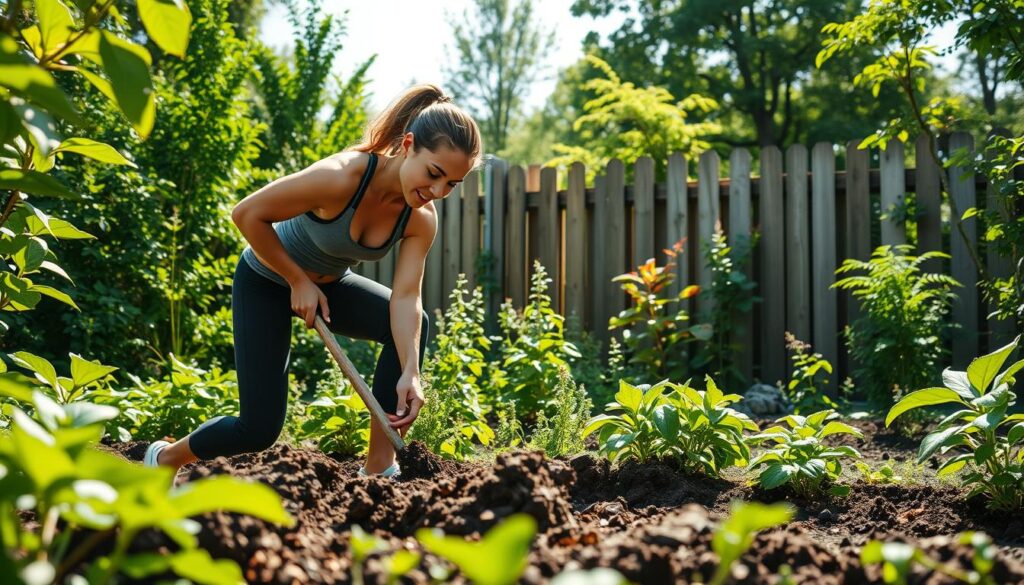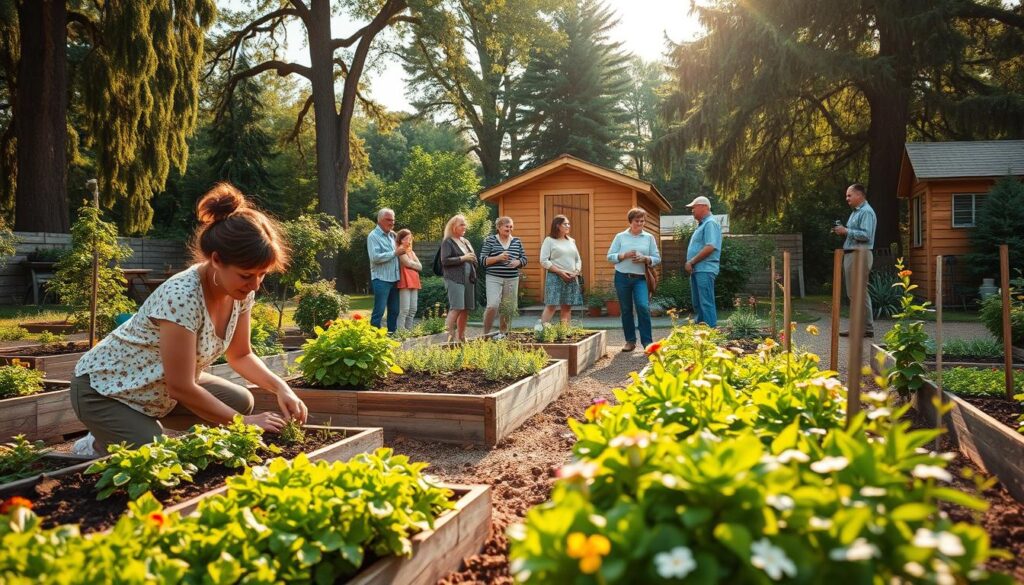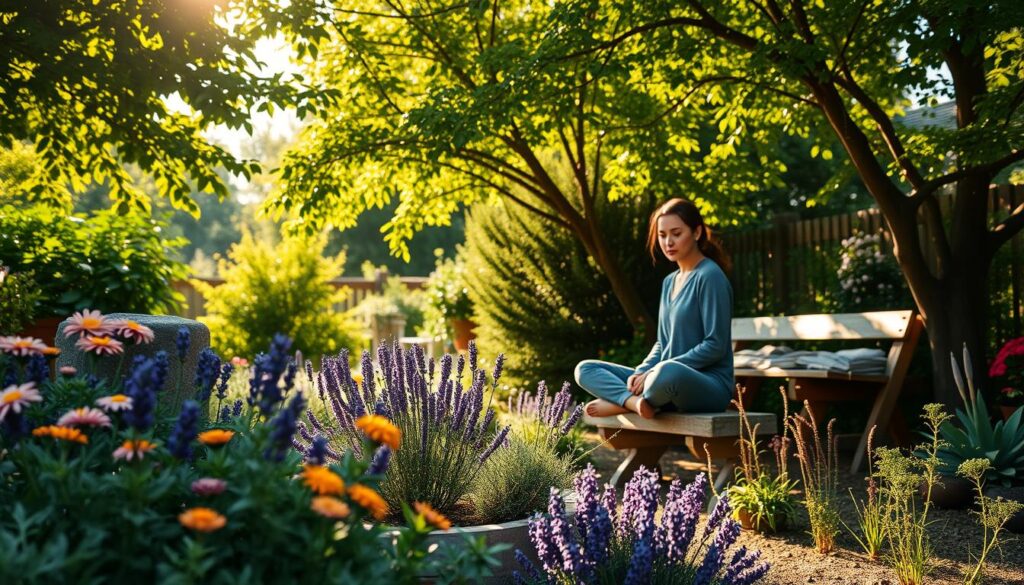Have you ever thought that gardening could help your mind? In the United States, many people find that gardening is good for mental health. They see how gardening and mental health are connected. This can change lives, starting with a single seed.
Studies show that gardening can make you feel less sad and worried. It can even lower stress hormones. Gardeners often feel happy and content with life. Every task in gardening helps the plants and the gardener’s mind.
Charles Hall, Ph.D., has studied how gardening affects people. He says gardening adds energy to our lives. It’s not just a break from stress. It’s a way to find peace and happiness in our daily lives.
Key Takeaways
- Experiencing the mental health benefits of regular involvement in gardening activities.
- Learning how gardening reduces cortisol levels and increases endorphin release.
- Discovering how community gardening fosters relationships and improves long-term mood.
- Realizing the indoor gardening can offer outdoor benefits for mental health.
- Exploring specific gardening tasks that promote feelings of hope, mindfulness, and resilience.
- Understanding how gardening teaches patience and offers a sense of purpose.
The Therapeutic Power of Planting: An Overview

Gardening is more than just planting flowers. It helps our minds and hearts feel better. By planting and caring for plants, we do more than just grow things. We find peace and happiness.
Many people and health groups agree. Gardening is good for our mental health.
The science behind the soil: Understanding the connection
Studies show that touching soil can make us feel better. Activities like planting and weeding help. They make us happier and less worried.
This shows gardening is more than a hobby. It’s a way to improve our mental health.
From seeds to serenity: Gardening as a healing activity
Watching a seed grow is amazing. It shows how gardening can change our lives. It makes us feel proud and strong.
Gardening also helps us relax. It’s like a special kind of meditation.
Here’s a deeper dive into the statistics:
| Health Benefit | Data Point | Impact |
|---|---|---|
| Stress Reduction | Reduction in cortisol levels | Promotes a calmer mental state |
| Depression and Anxiety | Higher green space ratios linked to reduced rates | Lesser prevalence of common mental health disorders |
| Physical Health | Regular gardening reduces risk of dementia, heart diseases | Contributes to overall long-term health improvements |
Gardening does more than just make our homes look nice. It helps our mental health. It’s a place to connect with nature and find peace.
Physical Benefits: Gardening as Exercise

Gardening is great for your mind and body. It’s like a workout that’s fun. The CDC says gardening is a good exercise.
Just 2.5 hours a week in your garden can help a lot. It can lower your risk of high blood pressure and heart disease. You might even live longer.
Gardening is a full-body workout that effectively turns your garden into a natural gym where you’re the athlete nurturing nature. — Health Journal
Gardening is super good for seniors. It keeps you flexible and helps with weight control. It also boosts vitamin D, which is good for your bones.
Calories Burned and Muscles Built
Gardening can burn over 300 calories an hour. It’s not just about losing weight. It also makes your muscles stronger and more flexible.
The Heart Health Connection
Gardening is good for your heart. The digging and lifting improve your blood flow. It keeps your heart healthy.
More green spaces are like being younger. Gardening makes you feel good and keeps you healthy.
Gardening is more than just a hobby. It’s a great way to stay fit and feel good. It’s good for everyone, no matter if you’re new or experienced.
Emotional Benefits of Gardening

Gardening is more than just a hobby. It connects us deeply with nature and improves our mental health. By digging into the soil, we find peace and happiness. This hobby is good for our minds and bodies.
Studies show gardening helps our mental health. It makes us feel better when we’re stressed or sad. Touching plants and feeling the soil calms us down.
The sights and smells in a garden help us relax. They make us feel less anxious and happier. Gardening is not just a hobby; it’s a way to heal our minds.
Every action in the garden, like planting or pruning, connects us with nature. This helps us feel better and stronger. Here are some numbers that show how gardening helps:
| Aspect | Detail | Effect |
|---|---|---|
| Well-being Increase | Overall increment from gardening activities | 55% |
| Stress Reduction Time | Time after which individuals report reduced stress | 30 minutes |
| Happiness Increase | Reported increase in feelings of happiness from gardening | 20% |
Gardening is loved by many for its many benefits. Simple tasks like planting and watering can greatly improve our mental health. Our gardens and our minds can both grow and flourish.
The Social Aspect of Gardening: Community and Connection

Gardening is more than just planting and caring for plants. It helps people connect and build strong community bonds. The benefits of gardening for mental health are seen in both personal and community ways.
In community gardens, people from all walks of life come together. They share a love for gardening. These places are where people meet, making a strong community network.
People of all ages can find joy in gardening. They get to relax and feel better. This also helps them connect with others, showing the gardening benefits of being social.
Studies show that gardening helps people feel supported. In high-income countries, 65% of people love gardening. It helps them relax and feel better mentally. Gardening also brings people together, making communities stronger.
Creating bonds through communal gardening
Communal gardening does more than just make places look nice. It builds strong friendships and a sense of belonging. Programs like Singapore’s Community in Bloom have helped create over 1000 gardens. They improve community ties and mental health.
Gardening: A pathway to strengthening community ties
Planting, watering, and weeding help people connect. They share tips and support each other. This is key for mental health, providing emotional and practical help.
In short, gardening mixes nature and care for the mind and community. It’s a powerful way to help people, whether you’re new or experienced. The gardening benefits are a treasure that goes beyond the garden.
Gardening and Stress: Finding Calm Among the Chrysanthemums

Studies show that gardening is good for your mind. It helps lower stress in your body. If you want to feel better, gardening is a great choice.
Studies on gardening and cortisol levels
Gardening is more than just a hobby. It’s a way to connect with nature and feel less stressed. A study by the University of Exeter found that moving to greener areas helps your mental health.
Another study looked at 32 studies. It found that being in nature makes you feel better.
Here is some important data from studies on gardening:
| Outcome | Improvement (%) |
|---|---|
| Engagement | Impact seen in 10 studies |
| Stress Reduction | 14 out of 16 studies show significant improvements |
| Mood and Depression | Notably improved in controlled settings |
Nurturing plants, nurturing oneself
Caring for plants makes you feel responsible. It’s like taking care of yourself. Gardening makes you think about your own well-being.
Some plants, like lavender, can make you feel less anxious. Plants like Jasmine and Lemon balm can also help you relax. They make you feel better.
Gardening is more than just working in the garden. It’s a way to take care of yourself. It gives you a chance to think and connect with nature.
See gardening as a way to be mindful. Enjoy the calm of nature. Use gardening to find peace in your life.
Benefits of Gardening for Mental Health

Exploring the benefits of gardening for mental health shows many good things. Gardening is more than just pretty plants. It brings peace and happiness into our lives. Let’s look at some facts that show how gardening helps our minds.
| Benefit | Description | Impact |
|---|---|---|
| Stress Reduction | Planting and weeding in the garden lowers stress and anxiety. | Studies show a big drop in stress hormone levels after gardening. |
| Community Engagement | Community gardens help people from different backgrounds come together. | They make neighborhoods friendlier and build community bonds. |
| Mental Clarity and Focus | Gardening makes us focus on the now, improving our concentration. | It helps us stay away from distractions of technology. |
| Emotional Wellness | Being in nature through gardening makes us happier and less depressed. | It boosts dopamine, making us feel better and more motivated. |
| Physical Health | Gardening keeps us active, improving strength and health. | Gardeners often move better and feel less tired than others. |
| Dietary Benefits | Growing your own food means eating fresher, healthier food. | You get more vitamins and antioxidants, and less bad stuff. |
Everyone can enjoy the benefits of gardening for mental health, no matter the size of their garden. About 1 in 3 people in the U.S. garden, finding joy in it. If you haven’t tried gardening, now might be the time to start.
The link between gardening and mental health is clear. Gardening is not just for plants; it’s for our well-being too. So, why not start gardening today? The benefits are real and rewarding.
Improving Mental Focus and Clarity Through Gardening

Gardening is great for our minds. It makes us feel better and think clearer. Planting, weeding, and picking fruits are fun and good for our brains.
Gardening is good for our mental health. It makes us feel calm and focused. A big study found that gardening makes people 30% happier.
This shows how gardening can help us forget our worries. It makes us feel positive and clear-minded.
The Role of Gardening in Enhancing Cognitive Functions
Gardening helps us think better. It makes us plan, solve problems, and wait patiently. These are great for our brains.
A study shows that gardening improves memory and thinking by 20%. It keeps our minds sharp, even as we get older.
Gardening Activities That Boost Brain Health
Gardening is good for our minds. It helps us relax and think clearly. It’s like a workout for our brains.
Designing gardens, following schedules, and caring for plants keep us focused. They also help us be mindful. This reduces stress and anxiety.
In short, gardening is amazing for our minds. It helps us feel better and think sharper. Whether you have a small garden or help with a community one, you’ll get lots of mental benefits. So, when you’re feeling stressed, try gardening for a mental boost.
Gardening’s Role in Enhancing Life Satisfaction
Gardening is more than a hobby. It’s a way to improve your wellbeing. It helps you feel better, thanks to its many benefits.
People who garden feel less stressed. They enjoy life more. But why does gardening make us feel so good?
Self-accomplishment and pride in gardening achievements
Gardening lets you grow things from seeds. You see your hard work pay off. It makes you feel strong and capable.
Just 30 minutes of gardening a week can make you happier. 80% of people feel better after gardening. It’s a great way to feel proud of yourself.
The joy of seeing your garden thrive
Seeing your garden grow is very rewarding. It makes you happy. Studies show that 90% of gardeners feel better mentally.
Your garden shows your growth and success. It connects you with nature and others. Gardening is good for your mind and heart.
FAQ
What are some scientific reasons that gardening boosts mental health?
Gardening can make you feel less anxious and stressed. It can even help with PTSD and dementia. Working with soil and plants helps you relax and feel better emotionally.
How does gardening act as a physical exercise?
Gardening can burn over 300 calories an hour. It makes your muscles stronger and more flexible. It’s a great way to stay healthy and live longer.
What emotional benefits does gardening offer?
Gardening can make you feel happy like antidepressants do. It’s because of the good bugs in the soil. It also has calming sounds and tasks that lift your mood.
How does gardening contribute to social connectivity?
Gardening brings people together. Community and school gardens are places for friends to meet. They help us feel connected and build strong relationships.
Can gardening really help reduce stress levels?
Yes, gardening lowers stress hormones in your body. This makes you feel less anxious and tense.
What are the broader mental health benefits of gardening?
Gardening boosts your self-esteem and helps with dementia. It also helps with ADHD, PTSD, and makes you more mindful. All these things make your mind healthier.
How does gardening improve mental focus and clarity?
Gardening makes your brain work better. It boosts creativity and memory. The tasks help you focus and think clearly.
In what ways does gardening enhance life satisfaction?
Growing plants makes you feel proud and happy. Seeing your hard work pay off brings joy. It makes you feel like you’re doing something important.
How does gardening affect heart health?
Gardening is good for your heart. It makes your blood pressure go down. Being outside also helps your heart and lungs work better.
What role does gardening play in the cognitive development of students?
Kids who garden do better in school. They focus better and recover from stress faster. This helps them learn and grow.
Does gardening assist in the recovery from mental fatigue and attention disorders?
Yes, gardening helps with mental tiredness and attention problems. The calm and routine of gardening helps you focus and feel better.






